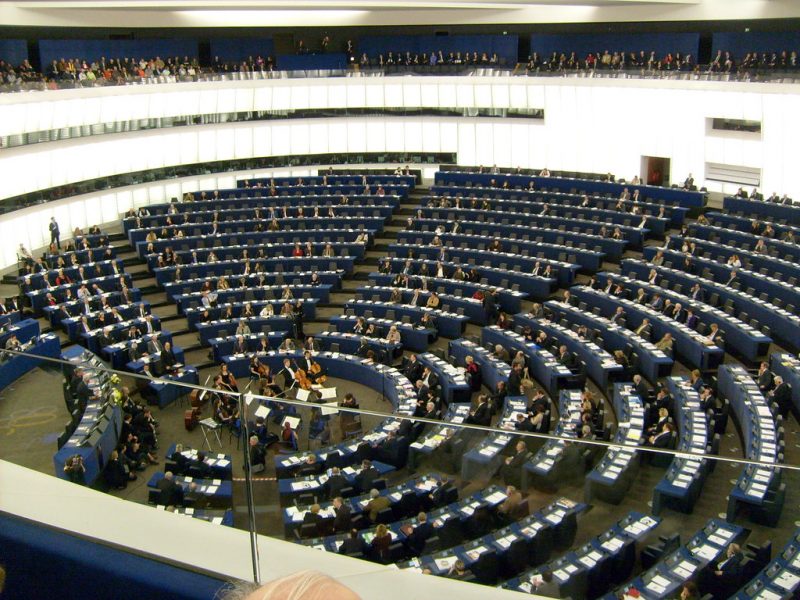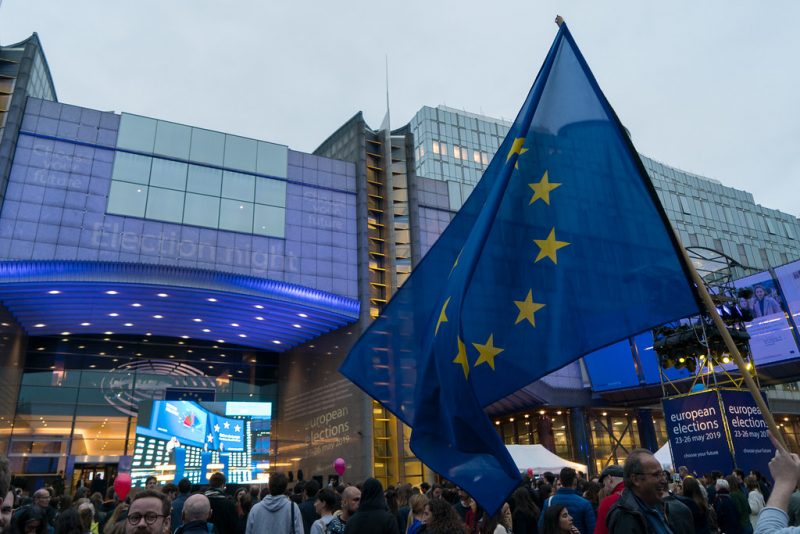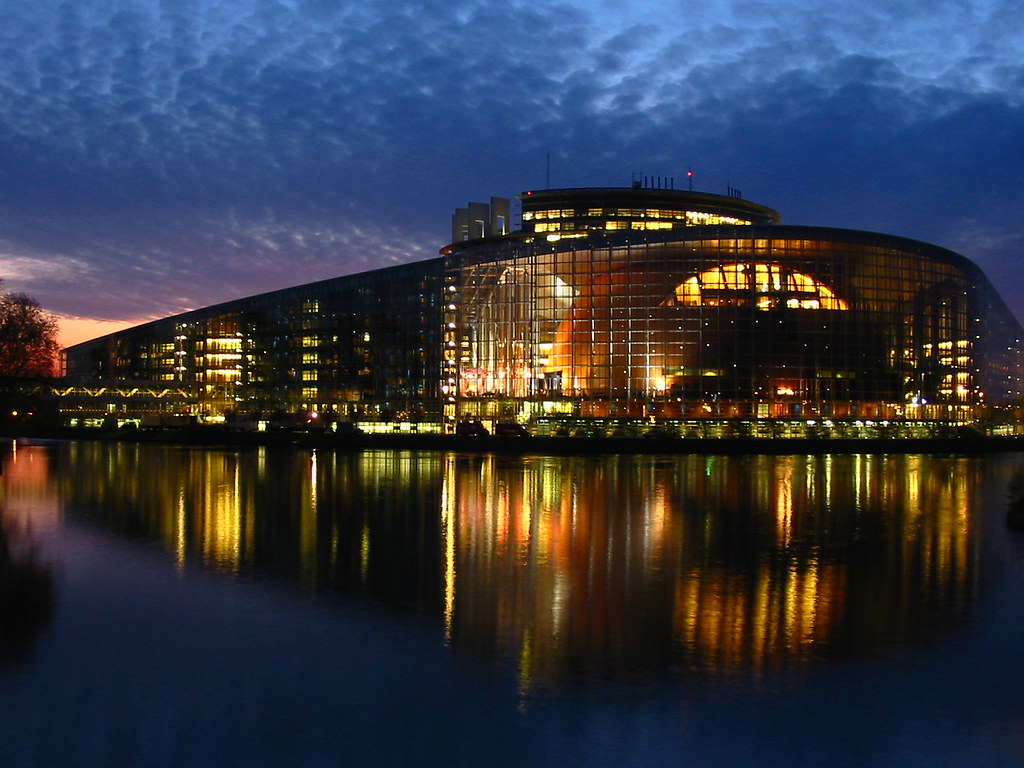Right-Wing Triumph
Across the European Union, exit polls for the recent union-wide parliamentary elections showed sweeping right-wing victories – on nearly all fronts. And, ironically, the appeal of these new representatives-to-be lies in their populist skepticism for the very institution in which they’ll be serving.
In Hungary and Poland, the incumbent right-wing populist parties were reinforced with around half of the electorates in both countries; even in Austria, where parties of the former right-wing government coalition are still reeling from a devastating corruption scandal, the leading People’s Party gained more votes than ever before with 34.9%.
Other formerly centrist-dominated EU states saw the rise of their own far-right populist parties, whose names would not have been given serious attention several years ago. The Spanish Vox Party, often described as ultranationalist and founded not so long ago in 2013, took its first three parliamentary representatives in this election – some pretty quick successes for a young party. And in France, Marine Le Pen’s National Front party, renowned for it’s anti-EU rhetoric, surpassed it’s mainstream competitors – coming in first with 23.23%.
For years many leftists have come to a wide array of conclusions as to why the European Right is increasing in popularity.
Some, like the Italian Power to the People party, blame the very workers they claim to be seeking to represent, calling anger at a mishandled migrant crisis part of a «racist logic.»
Others, like Jean-Christophe Cambadélis of the French Socialist Party, rationalize right-wing successes with conspiracy theories, claiming Russia is trying to destroy Europe by loaning money to populist political parties.
And nearly all of them represent pro-EU establishment parties that consider actions like Brexit to be dangerous and spurred on by migrant-hating racists. Although bourgeois elections are far from a perfect measuring stick of workers’ sentiments, the message is clear – European workers are dissatisfied with pan-European governance and right-wing parties are offering them a viable alternative.
Demise of the Left & Rise of Globalism
The Soviet Union’s collapse in 1991 was a major blow to the international Left and drastically changed the world’s political landscape. Without the potential for a devastating clash between two geopolitical superpowers, both imperialism and the anti-imperialist movement took on new forms – no longer defined by the dichotomy of right-wing capitalist West and left-wing socialist East.
The Marxist-Leninist Parties of Eastern Europe were banned, dissolved, or turned to social-reformism, while their sister parties in the West rejected ties to their Soviet past – falling into ideological confusion or buying into the capitalist system.
Having failed to reemerge in a form able to meet 21st century problems, the European Anti-Imperialist Left continues to decline with few ideas on how to move forward.
On the other hand, 20th century imperialism has entered the 21st in a new form, with the same U.S. and European capitalists at the helm. They no longer prefer the role of reactionary industrial Monopoly Man, manipulating the masses with a sense of nationalism and promises of spoils to fight his wars. Now they’re hip liberals who wonder why we can’t all just get along – and are against nationalism. They want to protect the environment by selling you overpriced electric cars and ban your straws, while millionaires eat caviar on their private jets. They want to help the third world modernize by outsourcing textile production to countries with the lowest wages and fewest labor laws. And of course, help NATO spread freedom and democracy to countries which aren’t socially liberal enough, through the barrel of a gun.
They are what people from across the political spectrum are now calling «Globalists»; imperialists coating their thirst for the world’s markets with concern for feel-good buzzwords like «human rights» and «freedom».

Flickr
Globalists In Action
Bill Browder, for example, is the globalist CEO of Hermitage Capital Management; it’s an investment fund involved in «activist shareholding,» which entails buying shares of companies to politically influence their management. In 1996, the fund invested $25 million in post-Soviet Russian companies, hoping to cash-in on the mass-privatization and suffering of working people going on at the time. Eventually, Browder also had the firm invest in Gazprom – the state-owned Russian gas company formed to ensure government control over Russia’s energy resources. The fund’s activism led it to accuse Gazprom of corruption but Russian officials found it was Browder who had been corrupt, having defrauded the Russian government of over $16.8 million in taxes. He then successfully lobbied the U.S. government and European Union to sanction Russia for «human rights violations.»
One of globalism’s more influential representatives, venture capitalist George Soros, gave $18 billion to his «philanthropic» organization, Open Society Foundations, in 2017 alone. The organization’s website claims activity «in over 120 countries,» giving «thousands of grants to groups and individuals who support [their] values.» By means of a philanthropic disguise, the same Soros, who funded the anti-soviet and left-masquerading Solidarity trade union movement in Poland, now has his hands in left-wing-sounding parties across Europe.
The names of EU Parliament representatives considered to be «reliable allies» of Soros’ foundation can be found in the leaked «List of Soros» – 226 MEPs who are all potentially getting their own piece of that $18 billion. It’s not surprising, then, why the German and French Green Parties, whose officials are strewn throughout Soros’ list, actually did great in the EU elections – coming in second and third place, respectively.
Although the list is mainly comprised of left-wing organizations, center-right European parties like the European People’s Party and the Party of European Conservatives & Reformists also make an appearance.
What do these parties from across the political spectrum all have in common? No matter how far to the left or to the right, they’ve formed a political alliance in support of the European Union’s existence as a supranational governing body – the cornerstone of globalist organization on the continent.

Flickr
Globalists vs. Populists = Capital vs. Labour
Back in February, Soros wrote an article for The Guardian warning of the Right’s rise in the EU-wide elections. He inadvertently describes the flashpoint of a new stage in European class struggle against global capitalism –«the cleavage that matters most today…between pro- and anti- European forces» i.e., globalist transnationalists and populist nationalists.
But more importantly, Soros attempts to convince his readers that «the party system…on which the EU was founded» is antiquated, embodying “the divisions that mattered in the 19th and 20th centuries, such as the conflict between capital and labour.”
Capitalist attempts to obscure the nature of class struggle by pointing out changes in the form of social conflicts are nothing new. But while the 21st century might look different from the last, with globalists on one side of the barricade and populists on the other, the content of the system remains the same. International capital still seeks indefinite resource exploitation and economic growth while labour continues attempting to assert itself in a global system it does not control.
As for political parties, they exist to represent the interests of a specific class in society. Soros’ claim that the party system is antiquated amounts to little more than a call to disarm working people of any political power it might be able to conjure.
United States of Europe: «Impossible or Reactionary»
In 1915, the great Russian Bolshevik revolutionary, Vladimir Lenin, asserted that «the idea of a United States of Europe, under capitalism, is either impossible or reactionary.» And while it’s existence has indeed been reactionary, its contradictions are day-by-day proving it also to be impossible.
As the EU continues to degenerate, nationalist factions of the European capitalist classes are looking to break with the transnationalist rules of globalism. These right-wing populist parties are the vehicles that will allow them to cut their own piece out of the international markets, without necessarily coming to a compromise with capitalists from other countries.
And with these parties vying more and more to represent swaths of European workers, the Left is faced with a new task – to form an internationalist and populist working class party intended on joining the anti-EU struggle for its own purposes.
This new party would need to combine forces with emerging right-wing parties that seek to reassert European national identities and protect their countries’ independence from cosmopolitan finance capital. Together, populists from across the political spectrum could seriously challenge the authority of the international capitalist class’ ruling faction – the globalists.
At the same time, the Left could use their party to agitate inside and outside of parliament, brining ideas of internationalism and scientific socialism to workplaces, cultural and religious centers, and other institutions where working people gather. With a Marxist understanding of history, the Left could take Europe farther down the path of social development than the EU dissolution right-wing populists have their eye on.
Instead of being subject to spontaneity, working class momentum like the Yellow Vest Movement could be harnessed in order to replace the European Union with internationalist governments run by workers. But if the Left does not rise to the occasion, the Yellow Vests, as well as future insurrections, will either dissipate in the manner of Occupy Wall Street or fuel the interests of right-wing populists who, alone, will only serve to break up the transnational globalist order in the short term.

















Leave a Reply